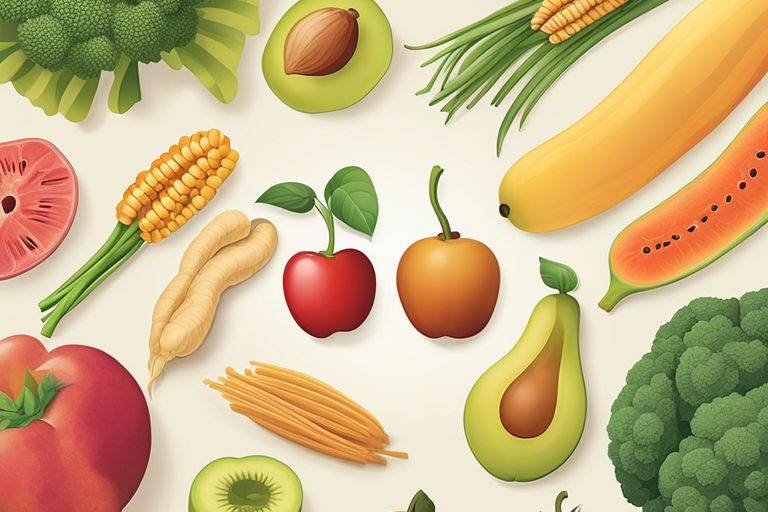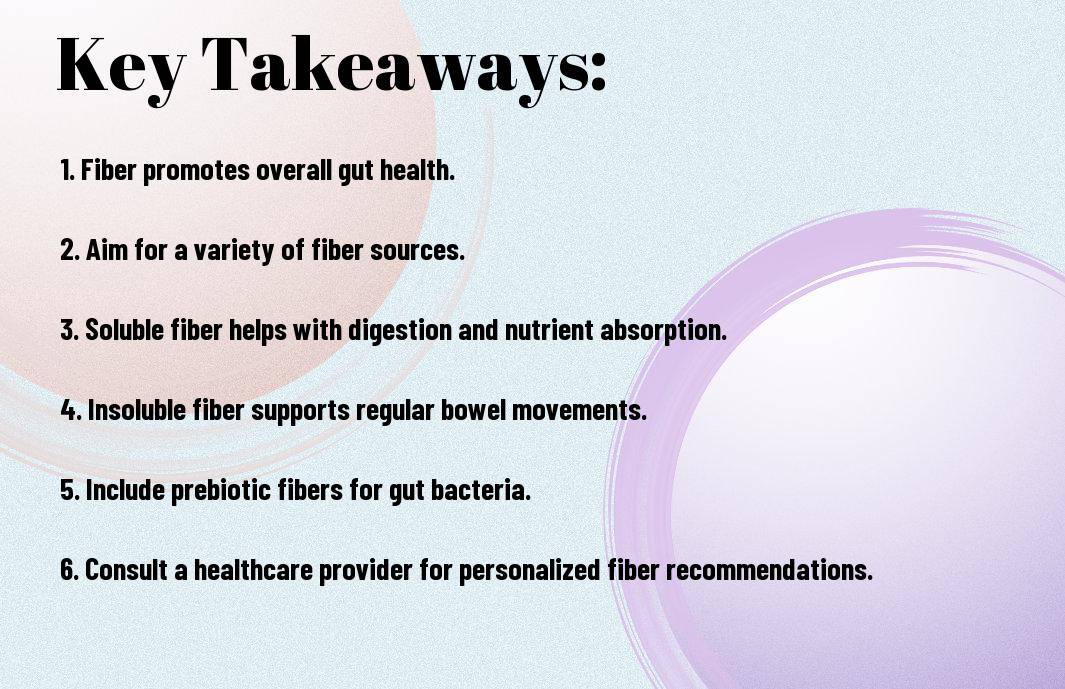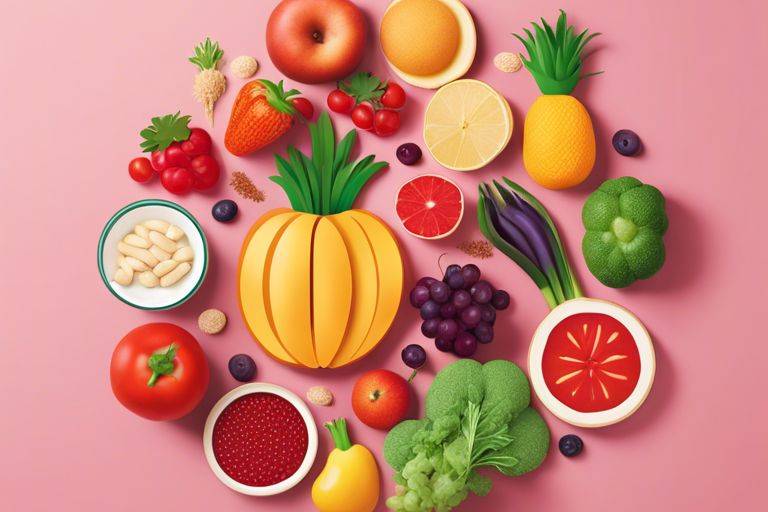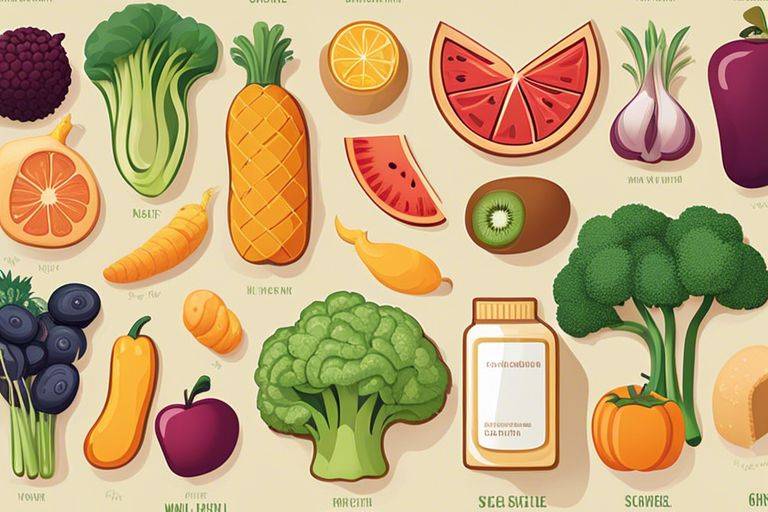
Newsletter Subscribe
Enter your email address below and subscribe to our newsletter

Enter your email address below and subscribe to our newsletter

It’s vital to prioritize fiber in your diet for optimal gut health. These 12 key fibers can significantly improve digestion and overall well-being. Incorporating a variety of soluble and insoluble fibers such as psyllium, pectin, and beta-glucan can promote healthy digestion and prevent constipation. Learn more about the importance of fiber in a healthy diet Dietary fiber: Essential for a healthy diet.


For optimal health, prioritizing your gut health is crucial. The gut-brain connection plays a significant role in various bodily functions, including digestion, immune system response, and even mental health. Any imbalance in the gut’s microbiota can impact your mood, energy levels, and overall well-being.
Overall, the health of your gut can greatly influence your overall well-being. A well-balanced gut flora can lead to improved digestion, better nutrient absorption, and a stronger immune system. On the other hand, an unhealthy gut can contribute to issues such as bloating, fatigue, and even mental health disorders.
There’s a myriad of fiber-rich fruits that can do wonders for your gut health. To promote a healthy digestive system, include fruits such as berries, apples, pears, and bananas in your daily diet. These fruits are not only delicious but also rich in necessary fibers that aid digestion and promote gut health.
Any fiber-rich diet should incorporate a variety of vegetables. Vegetables like broccoli, carrots, and leafy greens are packed with fiber that feeds the beneficial bacteria in your gut. Including a colorful array of vegetables in your meals ensures you get a diverse range of nutrients that support a thriving gut microbiome.
With their high fiber content, vegetables help regulate digestion, prevent constipation, and support overall gut health. Consuming a mix of both raw and cooked vegetables ensures you get a broad spectrum of fibers and nutrients to keep your gut happy and healthy.
Whole grains and legumes are excellent sources of fiber necessary for gut health. Incorporating foods like quinoa, brown rice, lentils, and chickpeas into your diet provides your gut microbiota with the nourishment they need to thrive. These foods not only aid digestion but also help maintain a healthy weight and reduce the risk of chronic diseases.
This fiber-rich group of foods plays a crucial role in keeping your gut healthy and functioning optimally. Including a variety of whole grains and legumes in your meals can boost your overall well-being and contribute to a healthy gut ecosystem.
Unlike 16 High-Fiber Fruits That Can Improve Your Gut Health, there are various sources of soluble fiber that can also benefit your digestive system. Let’s explore some of these crucial soluble fiber sources.
One easy way to incorporate soluble fiber into your diet is by adding oats and barley. These grains are rich in beta-glucans, a type of soluble fiber that can help lower cholesterol levels and promote a healthy gut. Try starting your day with a hearty bowl of oatmeal or using barley in soups and stews for a fiber boost.
Fiber-rich fruits high in pectin, such as apples, citrus fruits, and berries, are excellent sources of soluble fiber. Pectin acts as a prebiotic, nourishing the beneficial bacteria in your gut and supporting digestion. Including these fruits in your daily diet can help improve your overall gut health.
High levels of soluble fiber in these fruits can also help regulate bowel movements and reduce inflammation in the gut, making them a valuable addition to your diet for digestive wellness.
Soluble fiber can also be found in legumes and beans, such as lentils, chickpeas, and black beans. These plant-based sources of fiber are not only rich in protein but also support digestive health by feeding the good bacteria in your gut. Including a variety of legumes and beans in your meals can help promote a diverse gut microbiome and improve overall gut function.
Soluble fiber from oats and barley, fruits high in pectin, and legumes and beans can play a crucial role in supporting your gut health. By incorporating these fiber-rich foods into your diet, you can promote a healthy digestive system and overall well-being.
Many necessary fibers can enhance your gut health, and insoluble fibers play a vital role in this process.
Wheat bran and whole wheat are rich sources of insoluble fiber. Wheat bran is the outer layer of the wheat kernel and contains a high amount of insoluble fiber, which aids in promoting regular bowel movements and preventing constipation. Similarly, whole wheat products like bread and pasta retain the outer layers of the wheat kernel, providing a good dose of insoluble fiber to support digestive health.
Whole vegetables like broccoli, cauliflower, and cabbage are excellent sources of insoluble fibers such as cellulose. These fibers add bulk to your stool and help maintain a healthy digestive system. Including a variety of vegetables high in cellulose in your diet can promote regularity and support overall gut health.
A diet rich in vegetables high in cellulose can also help prevent digestive issues such as constipation and promote a healthy weight by keeping you feeling full longer.
High-fiber nuts and seeds like almonds, chia seeds, and flaxseeds are excellent sources of insoluble fiber. Including a variety of these nuts and seeds in your diet can promote healthy digestion and prevent constipation. Additionally, these fiber-rich foods offer necessary nutrients and antioxidants to support your overall well-being.
Vegetables and fruits are necessary components of a healthy diet, and including a variety of fiber-rich options can help improve your gut health and overall wellness.

All fibers are beneficial for gut health, but some fibers are considered prebiotics because they help nourish the good bacteria living in your gut. Prebiotic fibers are not digested in the small intestine but rather make their way to the colon where they serve as food for the beneficial bacteria.
One of the most well-known prebiotic fibers is inulin and fructooligosaccharides (FOS). These fibers are found naturally in foods like onions, garlic, leeks, and bananas. They help promote the growth of beneficial bacteria in the gut, supporting digestive health and overall well-being.
Fructooligosaccharides and galacto-oligosaccharides (GOS) are two of the most widely studied prebiotic fibers. GOS are found naturally in foods like legumes, beans, and certain grains. These fibers work by stimulating the growth of good bacteria in the gut, which can help improve digestion and boost your immune system.
Prebiotic fibers include a variety of compounds such as resistant starch, pectin, and beta-glucans. These fibers are found in foods like whole grains, apples, and oats. They help create a healthy environment in the gut by promoting the growth of beneficial bacteria and improving overall digestive health.
It’s important to include a variety of prebiotic fibers in your diet to support a diverse gut microbiome and promote optimal gut health. These fibers not only benefit your digestion but also have a positive impact on your overall well-being.
Despite its humble appearance, psyllium husk is a powerhouse when it comes to gut health. Psyllium husk is an excellent source of soluble fiber, which helps regulate bowel movements and promotes a healthy digestive system. With just a tablespoon a day mixed in water or added to smoothies, you can significantly improve your gut health.
One of my favorite gut-friendly fibers is chia seeds. These tiny seeds are packed with omega-3 fatty acids, antioxidants, and soluble fiber, all of which are beneficial for gut health. Adding a tablespoon of chia seeds to your daily diet can help improve digestion and reduce inflammation in the gut.
Another great benefit of chia seeds is their ability to absorb liquid and form a gel-like substance in the digestive tract. This can help regulate bowel movements and promote a healthy gut microbiome.
Fibers from ground flaxseeds are not only good for gut health but also heart health. Ground flaxseeds are rich in omega-3 fatty acids and lignans, which have antioxidant properties. Incorporating a tablespoon of ground flaxseeds into your daily routine can help improve digestion and support overall well-being.
It’s important to note that ground flaxseeds are more easily digestible than whole flaxseeds, allowing for better absorption of nutrients and promoting a healthier gut environment.
Health benefits of apple fiber extend beyond just keeping the doctor away. Apple fiber is rich in pectin, a soluble fiber that acts as a prebiotic, feeding the good bacteria in your gut. Including apple fiber in your diet can help improve digestion and support a balanced gut microbiome.
Apples are also a good source of vitamins and minerals, making them a nutritious addition to your daily fiber intake.
Ground green banana fiber is an excellent prebiotic fiber that can help promote the growth of beneficial bacteria in the gut. Green bananas are rich in resistant starch, which resists digestion in the small intestine and ferments in the large intestine, feeding the gut microbiota. Incorporating green banana fiber into your diet can help improve gut health and support overall digestive wellness.
Understanding the benefits of berberine for gut health is crucial. Berberine is a plant compound that has been shown to have anti-inflammatory and antimicrobial properties, making it beneficial for gut health. Including berberine-rich foods like goldenseal and barberry in your diet can help support a healthy gut microbiome and reduce inflammation in the digestive tract.
Fiber from pectin is another crucial nutrient for gut health. Pectin acts as a prebiotic, supporting the growth of beneficial bacteria in the gut. Including pectin-rich fruits like apples, citrus fruits, and berries in your diet can help improve digestion and promote a healthy gut microbiome.
Plus, chia seeds are an excellent source of beta-glucan, a soluble fiber that has been shown to have immunomodulatory and cholesterol-lowering effects. Including beta-glucan in your diet can help support a healthy gut and overall well-being.

Now, when it comes to improving gut health, incorporating high-fiber foods is crucial. You can find a list of such foods on High-fiber foods – Nutrition and healthy eating, which can help with digestion and overall well-being.
Glucomannan is a soluble fiber that can aid in promoting a healthy gut environment. It forms a gel-like substance in the gut, which can help with regular bowel movements and maintaining gut health.
Glucomannan from acacia fiber is a prebiotic that nourishes the good bacteria in your gut. For instance, it can help improve digestion, reduce bloating, and enhance nutrient absorption, leading to a healthier digestive system overall.
To enhance gut health, incorporating guar gum into your diet can be beneficial. It acts as a soluble fiber, aiding in digestion and possibly helping with weight management.
To further support digestive health, xanthan gum can be another valuable addition. Its gel-like properties can support regular bowel movements and contribute to a healthy gut environment.
Now that you are aware of the 12 vital fibers that can boost your gut health, remember to incorporate a variety of these fibers into your diet each day. Your gut plays a crucial role in your overall health, so take care of it by providing it with the necessary nutrients it needs to thrive. Your body will thank you for it!
A: Fibers are a type of carbohydrate that the body cannot digest. They are important for gut health because they help regulate digestion, promote the growth of beneficial bacteria in the gut, and prevent constipation.
A: There are two main types of fibers: soluble fibers, which dissolve in water and form a gel-like substance, and insoluble fibers, which do not dissolve in water and help move food through the digestive system.
A: Examples of soluble fibers include psyllium husk, oats, flaxseeds, barley, and fruits such as apples, oranges, and berries.
A: Examples of insoluble fibers include whole grains, nuts, seeds, vegetables such as broccoli, cauliflower, and green beans, and the skins of fruits and vegetables.
A: Fibers can boost gut health by promoting a healthy balance of gut bacteria, reducing inflammation in the gut, improving digestion, and supporting overall colon health.
A: The recommended daily intake of fiber for adults is 25-30 grams. However, individual needs may vary based on factors such as age, gender, and activity level.
A: You can incorporate more fibers into your diet by eating a variety of whole fruits, vegetables, whole grains, legumes, nuts, and seeds. Additionally, you can consider taking fiber supplements if needed.